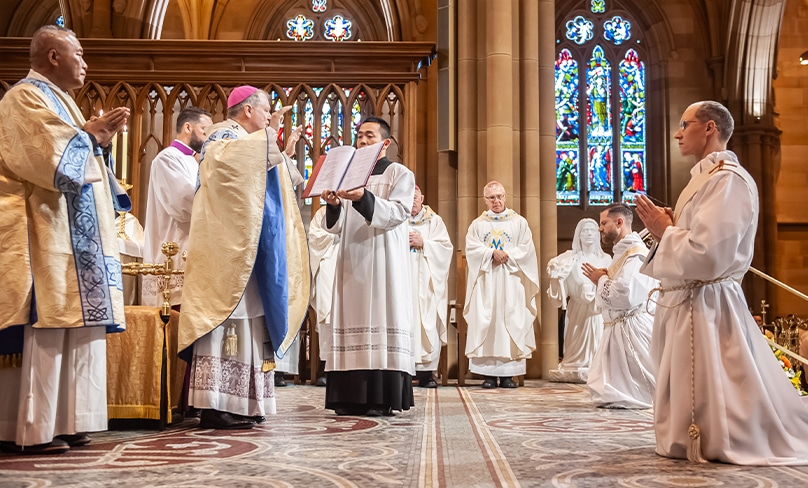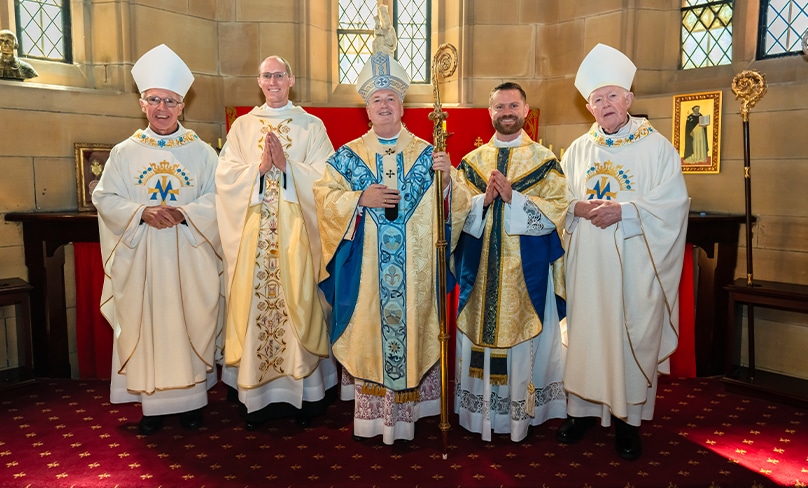
Homily of Archbishop Anthony Fisher OP for the Ritual Mass of Ordination to the Priesthood of Rev. Richard Sofatzis and Matthew Lukaszewicz at St Mary’s Basilica, Sydney, 9 September 2023.
In our highly sexualised culture, celibacy is often despised or belittled. It’s said no normal man would commit to it. Yet here in the Archdiocese of Sydney we will have four ordinations to the priesthood this year, we had five last year, six in COVID time, and six in the year before. A steady stream has meant the average age of the Sydney clergy has been declining for the past decade and a half. These younger priests are not just a happy statistic: they are men of intelligence, holiness and generosity, of evangelical zeal and pastoral solicitude. This year alone, we welcomed 17 new admissions to the seminary, the largest intake in nearly four decades. So much for the impossibility of attracting young men to the celibate priesthood today!
Some people don’t like things Catholic, and readily demonise anything different about our teachings and traditions. They tag celibacy “involuntary” though no one is born or forced into it. They even blame it for child abuse. To our great shame, some priests did indeed breach their vows and trust, doing terrible harm to victims, families and the church. But most priests by far live lives of chaste devotion to God and tireless sacrifice for their people, and abuse is an issue not just for our church but for families, churches and organisations without celibacy. By the time they are ordained, today’s candidates are generally a decade maturer and more experienced than were their predecessors, have been thoroughly screened psychologically, and have received far more human and spiritual formation. They strike me as very ‘normal’ psychologically, if rather counter-cultural in their idealism.
It’s been suggested that particular ethnic groups, such as Indigenous Amazonians or Australians, are incapable of celibacy. Yet the Gospel is for “every tribe and tongue and people and nation” (Mk 16:25; Mt 28:19; Acts 1:8; Rev 5:9-10) and must gradually convert culture. It took some parts of the West ten centuries to settle fully to priestly celibacy: why would we give up on Indigenous Australians after only two? And why should we acquiesce in the demands of a secular culture that we give up everything distinctive about Catholic Christianity?
Though our two candidates already promised celibacy at their diaconate, it hangs in the air today also. They will promise to act ceaselessly for their people, conform themselves ever more closely to Christ the priest, and offer themselves as a sacrifice to the Father—promising more than just being good Christians. As a dramatic sign of that “more,” they will prostrate themselves before the altar in radical abandonment to God’s will.
What is the “more” a priest offers to God? Not just his sexuality, of course, but his time and energy, fidelity and obedience, creativity and spirituality. But in the Western tradition, for much of the past two millennia, celibacy has been at the heart of this gift. The Lord praised those who were “eunuchs for the sake of the kingdom” (Mt 19:12) and promised rewards a hundredfold to those who renounced marriage and family for him (Mt 19:29). Like Jesus, Paul never married: he thought only single people could devote themselves entirely to the Lord’s affairs (1 Cor 7:8,32). Advocates of “reform” in the 16th and 21st centuries claimed celibacy is without warrant in Scripture, but it’s there in the New Testament and the lives of the first Christians.
Whether clergy should marry was hotly debated in the post-apostolic era. Saints, popes and synods increasingly mandated clerical celibacy, required sexual abstinence for married priests, and forbade remarriage of widowed ones. By the Middle Ages celibacy was the rule throughout the West. However imperfectly some lived it, its value was reaffirmed by the Council of Trent, and Vatican II called it “a sign and incentive of pastoral charity” and “a source of spiritual fruitfulness in the world”. Celibacy allows priests to share with Christ the very condition of his living, to cling to him “with undivided hearts and [to] dedicate themselves more freely … to the service of God and humanity”. As the Eucharist is a foretaste of the Wedding Feast of the Lamb in the world to come (Rev 19:7-9), so its ministers are a premonition of “the children of the resurrection” whom the Lord said “shall neither be married nor take spouses” (Lk 20:35-36).
Of course, the Roman Church allows exceptions to this, for example, for already-married Anglican clergy who become Catholic and are ordained for the Ordinariate. Our sister churches of the East, both Catholic and Orthodox, mostly have married priests and we fully respect their priesthood. Still, those churches insist that while some married men may be ordained priest, no priest can marry, and that those with the fullness of the priesthood, the bishops, are always celibates. Even married priests and laity value the sacrifice of their celibate brothers.
It’s possible that one day celibacy will no longer be the rule for Western clergy. There are serious arguments for change. But it may bring little gain and considerable loss. Protestant denominations have found it is no guarantee of vocational numbers, longevity, or fruitfulness. Consecrated religious and celibate priestly vocations have largely vanished in those churches as virginity and continence were devalued. Any change of discipline amongst Latin Catholics would also require a radical resetting of expectations as to priestly availability and funding.

More importantly, while good priests can struggle with aspects of their vocation, or differ over church discipline, I suspect few would actually forego their own celibacy. Others, seeking revolution in the church, want to see priests married. But as great a good as marriage is, Latin priests know that God requires something different from them. To act in persona Christi (in the person of Christ) means giving themselves totally to the church as their bride (cf. Eph 5:25-27), becoming spiritual fathers through the nuptial mystery of this undivided self-gift. Like the Blessed Virgin who gave her flesh totally to Christ’s coming in earthly flesh, so the priest gives his own for Christ’s coming in His Eucharistic Flesh.
Of course, some priests live a cold, lonely or frustrated continence. It requires, as Pope Francis has emphasised, a certain grace to live celibacy wholly and joyfully—as indeed it takes to live consecrated, married or single life well. But celibacy can also be “a means of sanctification” through healthy relationships “of true esteem and goodness deeply rooted in Christ”. Which is why, for all the talk at the Amazon Synod of dropping clerical celibacy for certain ethnic groups, Pope Francis chose to reaffirm the Latin church’s commitment to it. He recently told reporters it was naive to think vocations shortages would be solved by allowing married priests: rather, the church must address cultural resistance to chastity and self-sacrifice. Whatever future popes and councils might decide, he declared he’d rather die than be the one who undermined this noble tradition.
Today two men, our sons and brothers, are called to conform themselves to Christ as priests and so offer themselves totally to the Father as He did. Matthew is from a Polish-Australian background and as a babe-in-arms was blessed by St John Paul II. Perhaps that doomed him to be a priest! But growing up he was more interested in being a professional tennis player and airline pilot. He was well on the way to both when the power of the rosary turned him around. He got more involved in his faith through daily Mass, spiritual reading and Catholic events. He studied philosophy in Rome and Cracow and the desire to give himself completely to God and his church only intensified.
Alongside our Polish-Aussie priestling is an Anglo-Greek one, born and raised in South-West Sydney. He attended a Greek Orthodox school but his Mum, now deceased, raised the children Catholic. A priest kick-started the idea of priesthood in him, but like Matthew he pursued engineering first. In both families, dedicating oneself to God is not so unthinkable: Richard has a priest brother and Matthew’s sister is a sister. Concerned especially for those abandoning the faith, Richard finally took a leap of faith into the seminaries of Homebush and Rome. Yesterday he turned 33, so he is the perfect age for being conformed to Christ the Priest.
Richard and Matthew, my dear sons, the world wonders why men like yourselves would embrace celibate priesthood in the Catholic Church today. The reason you give is simple: you want to give God and his people your all—your minds and hearts, souls and bodies. As our epistle today teaches (Eph 4:1-13), by living a life worthy of your vocation you will build up the church in unity and individual souls in faith. And so, echoing our first reading (Isa 61:1-3), we will anoint you to bring good news, healing, liberation and favour. But it is our Gospel (Jn 15:9-17) that best explains your commitment and ours: as priestly celibates you must be great lovers. You must abide in Christ’s love, keeping his commandments of love, laying down your life for love of his people. Those people will be praying for and supporting you, not just as you lie prostrate before the altar but always, for they greatly appreciate what you are giving them and God. So may you grow in the knowledge, communion and service of the Lord, until in Paul’s words you become “perfect men, fully mature with the fullness of Christ himself.”
